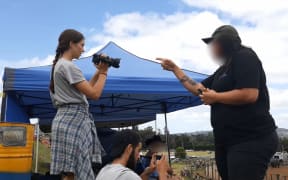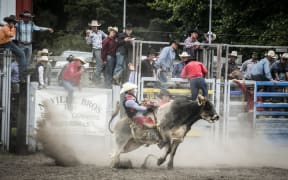Rodeo fans and animal welfare campaigners are at loggerheads over the future of the sport, with frustration on both sides, to the point where scuffles broke out at an event in January.
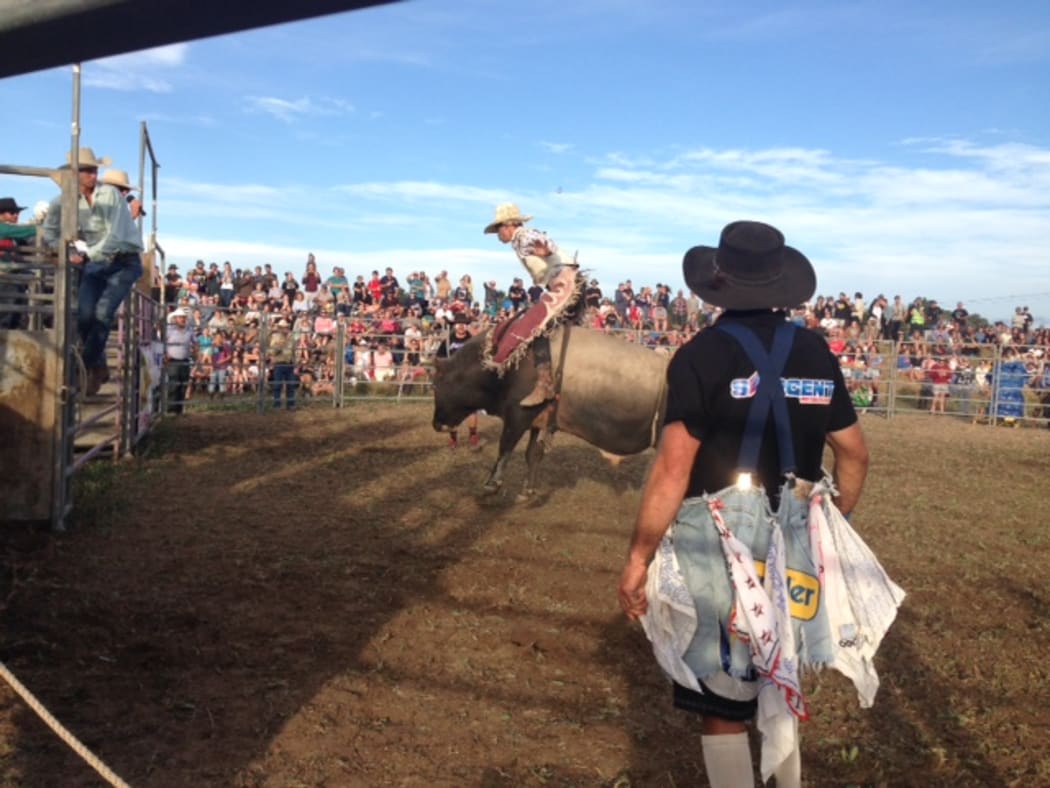
Photo: Supplied / Graham Smith
In 2016 a petition signed by 62,000 people calling for a ban on rodeos was delivered to parliament, but since then the issue appears to have dropped off the government's radar.
However, in a few weeks the Green MP Gareth Hughes intends tabling a private members bill that would ban using small calves and animal wrestling. But ultimately he would like rodeos banned.
RNZ reporter Karoline Tuckey went along to Martinborough's Pukemanu Bull Ride on 1 February, for a closer look at rodeos.
Rock music blared from speakers, hot dog stalls did a rip-roaring trade, and the embankments were packed with families, flannel shirts and cowboy hats at the annual Pukemanu Bull ride on Friday.
Bull riding events make up about half of a full rodeo, with riders trying to stay on the back of a bucking bull for eight seconds, to be eligible for points.
The bulls are massive walls of muscle, with two ropes tied around their middle - one at the front for the cowboy to hold onto, and one against the back legs to produce the bucking.
Staying on looks near impossible, and most riders hit the deck almost immediately, then try to quickly scramble away from the bulls feet coming down around them, while rodeo clowns attract the attention and ire of the .
Hunterville's Will Bruce was the first rider to stay the eight seconds on Friday, and came back to the pens breathing hard and grinning.
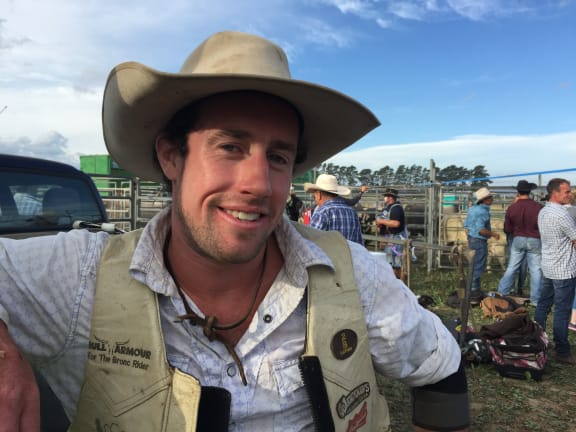
Photo: Karoline Tuckey / RNZ
"Adrenaline was about 1000 out of 100, I was sitting a bit loose, but you've just got to hang on for the ride really. My outside foot got a bit loose on him, and I just kind of let that happen, it gets you a bit more points doing that.
"You just kind of hang on with whatever you can really. Obviously it's your hand you're holding on with, but we hang on with your knees and these big spurs we've got here, they provide our grip for our feet."
Mr Bruce said he's happy to accept that there are different opinions about his sport, but wishes people would actually come and see a rodeo before they make up their minds.
"The conditions of these bulls - they're nice and fit, and healthy and happy."
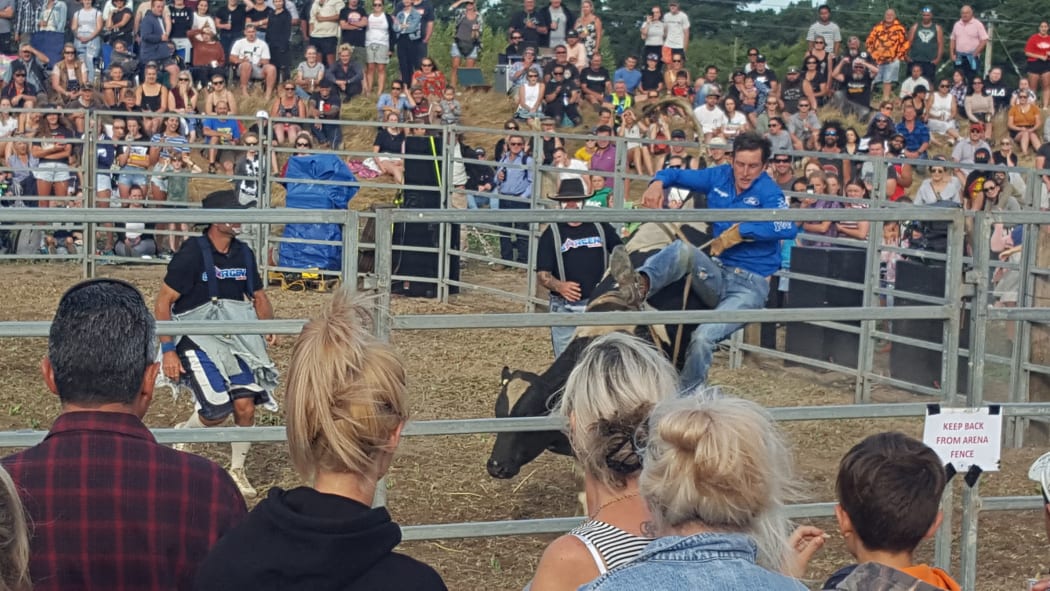
A rider mid-dismount as he is bucked off a bull. Photo: Karoline Tuckey / RNZ
He has been bull riding for about nine years, and says the community is a pretty tight "family".
"I got booted in the head on Christmas Day, and opened up my ear a bit, I had a few stitches there and in my chin, and and had my knee dislocated. I've been kicked and jumped on a bit, but other than that I've got a pretty clean bill of health.
"It's the kind of sport that's really addictive, once you get a feel for it, you know you just can't stop. We keep coming back for more because it's such fun, and it's always a good crowd down in Martinborough, the crowd's a huge bonus."
Keeping an eye out for the animals were two vets, and Rodeo Cowboy Association Animal Welfare Officer Simon Tahau, who said his job was usually "pretty boring" as people are well behaved.
"I keep a good eye on the animals, and make sure that none are injured, and if they are injured, make sure that the vet gets to see them pretty quickly.
"The rules are very good."
He thinks there are some alarmist attitudes amongst opponents, and many of them are townies who know almost nothing about rodeo or stock.
"We love our animals, 99 percent of us are all farming-oriented people, so we know the value of having healthy stock.
"And honestly if these things didn't enjoy what they do, they wouldn't do it.
"It's the same as the horse racing, if it doesn't want to run, it won't run. They're only any good if they enjoy it."
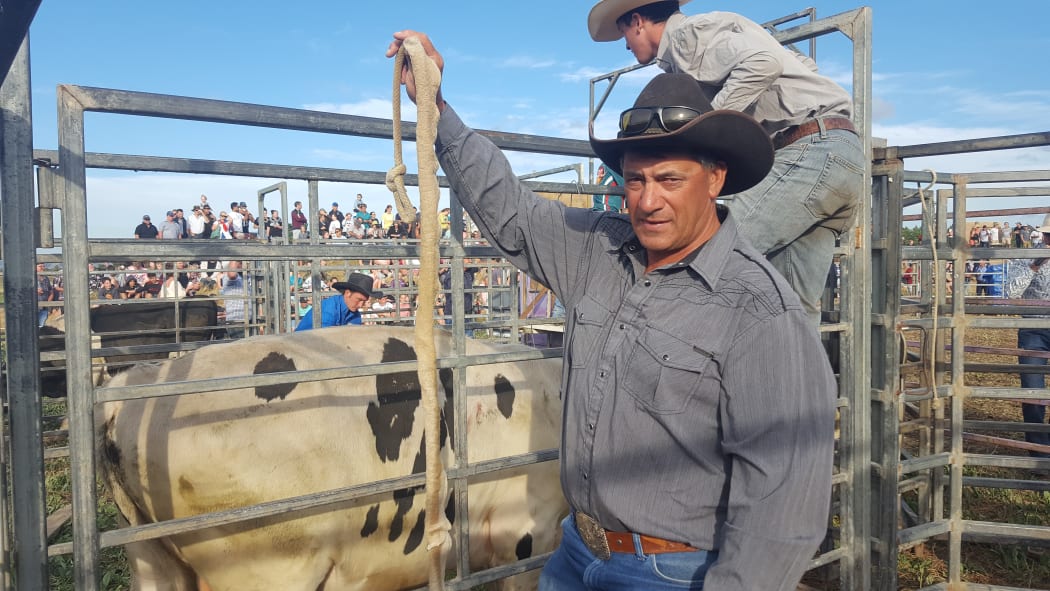
Rodeo Cowboy Association Animal Welfare Officer Simon Tahau. Photo: Karoline Tuckey / RNZ
The community side of rodeo reflects the 'give-it-a-go', challenging vein to rural life, and the events have a fun family-oriented atmosphere, he says.
Rodeo arrived here from American in the 1960s, and a national circuit is popular in rural districts, with a small but tight community of competitors, and regular crowds turning out to watch more than 30 events a year.
Many of those at the event come along every year, like Martinborough's Tennesse Liumaihetau, who said the riding was impressive.
"It's an awesome night tonight, good turnout, it's good for the town, good for people to come out and actually see what it's all about, the cows are well looked after, and the weather's not too hot like it has been all week.
"They've got a lot of supporters. I'll definitely come back again."
At the front gate, about 45 protesters from throughout the Wellington region were unconvinced the animals enjoyed the show as much as the fans suggested.
Lauren Orchard, said it was important to take a stand for animals, and let people know what goes on at rodeos.
"It's really obvious that a lot of the practices are cruel.
"In New Zealand a lot of us are animal lovers, I find it really distressing knowing that animals are undergoing such cruel treatment at the hands of people, we're meant to be protectors of animals."
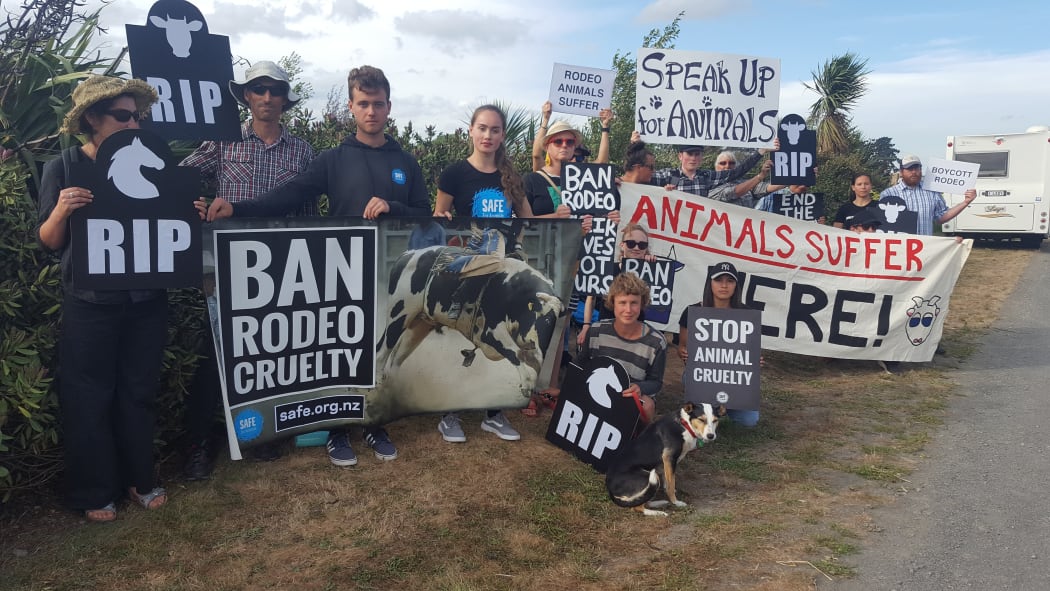
About 45 protesters from throughout the Wellington region showed up to oppose the Martinborough event. Photo: RNZ / Karoline Tuckey
Green MP, Gareth Hughes who was at the protest, says rodeo is from the Wild West, and is increasingly out of step with what is socially acceptable in New Zealand.
"Previously in history things like dog fighting, cock fighting, bear baiting were all considered legitimate parts of community entertainment, and I think rodeo is coming into that category too, because we literally see the animals in pain, in distress.
"They're literally dying at these events, and I think no animals should be dying for entertainment."
Hughes says there is an increasing swell of complaints against rodeos, and people who support banning it.
"It no longer reflects modern farming practices in New Zealand, rodeos only work because the animals are in pain and distress.
"I think the farming sector needs to understand that this is a risk to our agricultural exports, we would never treat animals in farms the way we treat them in rodeos."
Mr Hughes says if his bill is drawn from the ballot he hopes it will get support from Labour, which promised before the last election to review the rules around rodeos.
